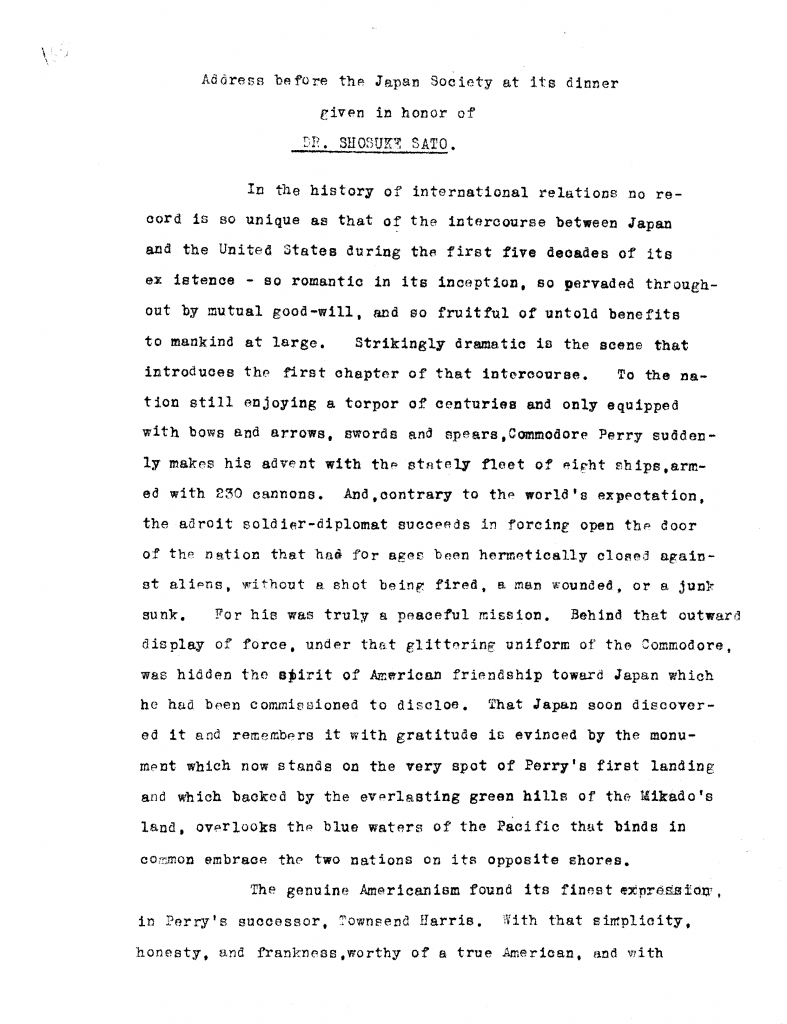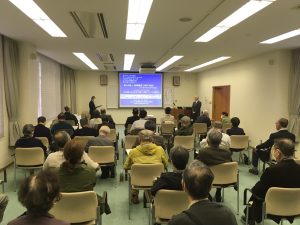高峰譲吉ジャパン・ソサエティでの講演原稿/1914年3月31日
19世紀後半から20世紀前半にかけて、アメリカでは黄禍論と呼ばれる黄色人種に対する脅威を煽る人種差別がありました。
1913年、カリフォルニア州で外国人土地法が制定され、外国人の土地所有や借地に強い規制がかけられました。「黄禍」の名のもとに、アジア人とりわけ日系人を排斥することが目的で、日米間の関係が悪化の一路をたどる大きな要因となっていました。
そんな中、高峰博士は日米間の感情を立て直すために全米を旅行し講演活動を行っています。その際、講演の目的とその内容について珍田捨巳米国大使宛に、いくつか原稿を添付して提出しています。
今回は、そのうちの一つを取り上げます。
この原稿は、100年以上前の古い資料で、1914年3月31日にJapan Society総会の夕食会で高峰博士が講演した演説原稿を、当研究会の山本綽名誉理事長が打ち直したものです。
講演のタイトルは「佐藤昌介博士記念夕食会におけるジャパン・ソサエティ講演」です。
下記に原稿のオリジナル、日本語意訳文、リタイプした全文を合わせてご紹介します。また、全文を正しく翻訳するとかなりのボリュームで読みづらい文章となりますので、全体の意味をくみ取った意訳文でのご紹介となることを予めご了承ください。
この夕食会は、アメリカ人(白人)の参加者が多かったと思われます。文中から推察するに、高峰博士は参加者のみならずアメリカ全体に対して、いかに日本という国を伝えるか心を砕いていたようです。
なお、佐藤昌介博士は、1856年生まれで、「少年よ、大志を抱け」で知られるクラーク博士の札幌農学校第一期生です。農業技術を学ぶために米国留学の経験もあり、高峰博士と同じく農商務省御用掛に就任しています。自身が卒業した札幌農学校を帝国大学へと昇格させるために尽力し、北海道帝国大学初代総長となりました。
1914年1月、佐藤博士は第2代日米交換教授(初代は新渡戸稲造)としてアメリカに派遣されています。前年末に、渋沢栄一が名誉委員長を務めるニューヨーク・ジャパンソサエティが主催の送別会が帝国ホテルで開かれました。この頃高峰博士は帰国中で、「渋沢栄一と高峰譲吉 その4」でお伝えしたAP通信のケネディ支局長の送別会も同時期に帝国ホテルで開催されていることから、佐藤博士の送別会にも高峰博士が参加した可能性が考えられます。
1914年3月31日は、コロンビア大学(ニューヨーク)で佐藤博士の講演があったことが確認できていますので、アメリカに戻った高峰博士がジャパンソサエティの総会及び夕食会に招待したのかもしれません。いずれにしても、渋沢-高峰-佐藤のつながりが想像されます。
佐藤昌介博士記念夕食会におけるジャパン・ソサエティ講演
国際関係の歴史の中で、日本とアメリカにおける交流の始まりほどユニークな記録はありません。これほどまでにロマンティックで、互いの善意に溢れ、そして人類全体に無限の利益をもたらしたものはないでしょう。
両国の物語は、第一章一幕から劇的な展開をみせました。弓矢と刀、そして槍の原始的な武器しか持たず、何世紀にもわたって異国との交流を鎖していた国民の前に、ペリー提督が230砲もの大砲を装備した8隻の大艦隊を率いて突然現れたのです。
そして、この有能な軍人・外交官は、一発の銃声もなく、一人の人間も負傷させることなく、何世紀にもわたって閉ざされていた我が国の扉を開くことに成功したのです。これは真に平和的な任務でした。圧倒的な力と提督のきらびやかな制服の下には、アメリカの日本に対する友好の精神が隠されていました。
我が国がそれをすぐに発見し感謝の念をもって応対したことは、ペリーが最初に上陸したまさにその場所に立っている記念碑が証明しています。この記念碑は、帝国の緑の丘を背に、2つの国を結ぶ太平洋の青い海を見下ろしています。
真のアメリカニズムは、ペリーの後継者であるタウンゼント・ハリスにも引き継がれていました。ハリスは、アメリカ人にふさわしい素朴さ、正直さ、率直さを持ち、完璧な機転と無限の忍耐力で、自分の行く手を阻むあらゆる障害や偏見を克服し、ついには余人をもって代えがたい幕府の助言者となったのです。
このようにして始まったアメリカとの公正で友好的な関係は、その後の政権でも一貫しており、皇居で大統領の代理を務めた有能な特使、プルインとビンガム、ブーフとオブライエン、グリスコムとアンダーソンによっても証明されました。
下関賠償金の返還、古い条約の改正、日露戦争の平和的解決、これらのために提供された善意や、タフト政権下で交渉された通商条約が他国との新しい条約の締結を成功に導いたことなど、
数え上げたらきりがありません。
これらは日米交流の重要な道すじとなり、グラント将軍の「アメリカ大陸の影響力がどのようなものであろうと、それが常に正義と優しさのために発揮されてきたと考えることを私は誇りに思う」という言葉を思い起こさせます。
アメリカ政府のみならず、アメリカ人個人が日本のために行ってきた奉仕活動も同様に寛大で重要なものでした。実に多くのアメリカ人達が近代日本に輝きを添えています。
マレー、ティソン、テリー、モース、クラーク、キャプソン、メンデンホール、フェノロサは、教育者として、あるいは教育制度の組織者として、日本が彼らや彼らの仲間たちに負っている恩義の大きさを思い出させてくれます。また、政府の忠実なアドバイザーとしてのデニソンとスティーブンス、作家としてのグリフィス、キューリック、ラフカディオ・ハーン、ヘップバーン、バーベック、ブラウン、ラヴィーズ、グリーン、デフォレスト、ハリスは宣教師の中でも先駆者であり、光り輝く存在でした。
そして、何千人もの有能な日本の若者を教育し、父親のような愛情を注ぎ、祝福して送り出してくれたアメリカの大学の学長や教授たちに、日本はどれほど感謝していることでしょう。
日本の若者が在籍していない大学を探すことは困難であると言っても過言ではありません。そして、この何千人もの学生たちの心の中には、大学時代に受け取った愛と優しさが刻まれていて、それは心臓が鼓動を続ける限り、大切に記憶されていくことでしょう。
私自身も恩師であるジョン・ホプキンス大学の故ハーバート・B・アダムス教授に対して言葉では表せない恩義を感じています。このようなアメリカの恩人や友人に対する感謝の気持ちは、ほとんど国民的なものです。
それゆえ、アメリカ人であることは、日本国民の尊敬と愛を集める最も確かな印だったのです。セイツ氏は、「日本人がアメリカへの恩義を深く認めて、アメリカ人の訪問者に対する
純粋な信頼と感謝の気持ちが痛いほど伝わってきます。」と言っています。繰り返しになりますが、半世紀にわたる日米交流に対する祝福ほど、美しく高貴な国際関係はありません。
しかし、20世紀の幕開けは、この幸福な歴史に突然の転機をもたらしました。それは、自然の摂理に、狡猾な人々が策謀を混ぜたのです。
19世紀末、ペリーが世界の国々の仲間入りをさせた幼き国は、必死に政治的、社会的な生活の仕組みを再構築し、西洋の水準に合わせました。しかし、過激な西洋人の心の中で日本の評価を高めたのは、平和的な芸術の進歩ではなく、隣国との2回の戦争で成功して得た軍事的威信でした。
そして、彼らの熱狂的な想像力と偏見から「黄禍論」と呼ばれる奇妙な怪物が生まれたのです。
さらに、西洋人を困惑させたのは、日本が戦争の武器を巧みに操るだけでなく、商工業を発展させる能力を持ち、商業分野、特に中国の市場で競争相手となってきたことです。これが、市場を開拓し発展させてきた人々の気に入らなかったことは、強調するまでもありません。
アメリカと日本の円滑な友好関係を妨げる、不幸な事態が発生してしまったのです。カリフォルニアの状況については、ここでは触れません。しかし、日本人は、ワシントンもリンカーンも知らないヨーロッパから来た外国人によって、アメリカにも大きな変化が訪れたことを初めて知り、ショックを受けたのです。
先ほど述べた、カリフォルニアの状況、中国の商業的競争、軍事大国としての日本の急激な台頭、これらは、狡猾な人々にとって非常に便利な攻撃材料となりました。
残念なことに、イエロージャーナリズム(発行部数や売上を伸ばすために、事実を曲げ扇情的なニュースを発信する)や強力な利害関係者は、これらの材料や機会を見落とすことなく、巧みな世論操縦を駆使し、自分たちの政治的ゲームや自己利益のために利用しているのです。
報道関係者を満足させるために、あるいは造船所や鉄鋼業を忙しくするために、または、海軍法案を議会に通すために、「戦争への恐怖」が必要であれば、その目的のためにいつも日本は利用されていました。
パナマ運河の通行料に関する論争にも、日本は引きずり込まれています。実際、イエロージャーナリズムは、自己の目的を達成するために、あらゆる方法で日本を誹謗中傷するのみならず、でまかせの野心を日本になすりつけ、虚偽の告発を行い、日本の女性の公正な名を汚してきました。
この種の攻撃は、大統領でさえも無縁ではないこの国では、その額面通りに受け取られることはほとんどありません。しかし、日本の場合は違います。日本はアメリカ国民にほとんど知られていないし、理解されていない国です。そのため、日本についての誤った表現や嘘の話は、他の場合に比べてはるかに大きな傷を負わせることになるのです。無邪気で無知な人々の心に知らず知らずのうちに植え付けられたこれらの偽りのレッテルは、彼らの意見を形成し、日本を彼らから遠ざける要因となります。
我々は、日本が賞賛に溢れていた日露戦争の頃から、ワシントン政府の強力な抗議にもかかわらずカリフォルニア州議会で排日土地法案が制定された時までの、世論の変化によってどれほどの疎外感を受けたでしょうか。
太平洋を挟んだ両岸のステートメントマンの協力は、それだけで100倍の力になり得ます。ならば、健全な世論を形成するために、正義感のある強力な組織が主張し、力を発揮する時ではないでしょうか。私はアメリカにおいて、この晩餐会に集まっている私たちジャパン・ソサエティほど、健全で強力な影響力を発揮している、あるいは発揮しうる組織を知りません。
ジャパン・ソサエティは、教育者、作家、編集者、政治家、弁護士、資本家、ビジネスマンなど、あらゆる分野の男女の代表者で構成されており、その範囲はすでに全米に及んでいます。東洋美術への愛着を育み、日本への旅行を奨励し、極東の時事問題や思想に関する知識を広め、社交場に東西の有力者を集めるなど、様々な活動を行っていることから、ジャパン・ソサエティは日米間の理解を深めるための最も貴重な礎となっています。
ジャパン・ソサエティには、会長と事務局長に優秀な人材を迎えたことに、大いに祝福すべきです。この二人の優れた資質の組み合わせほど幸せなものはない。機知に富み、精力的で、大きく広い心を持った会長を、親切で忍耐強く、細部にまで気を配る疲れ知らずの事務局長が補佐しているのです。
この二人の有能な役員が、知恵と経験を備えた執行委員会によって支えられ、導かれているとき、ジャパン・ソサエティは、その影響力のさらなる拡大と崇高な目的の推進にむけて希望を持って前進することができます。我々はジャパン・ソサエティに3回の乾杯と3回のバンザイを叫んでも良いのではないでしょうか。
アメリカと日本の古い関係、つまり家庭教師と生徒のような関係がこれからも続くとは考えられません。日本はすでに成熟しています。今後、アメリカを友人あるいは同盟国として仰ぎ、アメリカは日本を対等に扱うことになるでしょう。そして中国市場での競争相手となれば、それぞれが相手に男らしく健全なライバルであることを証明するでしょう。とはいえ、このような古い関係の崩壊、かつての友好的な関係が海に流されてしまうことは、許されないことです。
両国の緊密な関係を促す声は、これまで以上に強く、大きくなっています。日米両国には、多数の共通目的があります。アジア全体に伝えるべき文明、中国における維持と門戸開放の政策、太平洋に隠れる膨大な資源の開発、そしてますます重要性が高まる日米間貿易。これらは、日米の友好関係が、いかなる詭弁も影響を与えず、いかなる社会問題でも圧倒することはできない、ますます緊密になることを示す強力な論拠であります。
Address before Japan Society at the dinner given in honor of Dr. Shousuke Sato.
In the history of the international relations no record is so unique as that of the intercourse between Japan and the United States during the first five decades of its existence-so romantic in its inceptions,so pervade throughout by mutual good will, and so fruitful of untold benefit to mankind at large. Strikingly dramatic is the scene that introduces the first chapter of the intercourse. To the nation, still enjoying a torpor centuries and only equipped with bows and arrows, swords and spears, Commodore Perry suddenly makes his advent with stately fleet of eight ships armed with 230 cannons. And contrary to the world expectation, the adroit soldier-diplomat succeed in forcing open the door of the nation that for ages been hermetically closed against to aliens, without a shot being fired, a man wounded, or junk sunk. For this was truly a peaceful mission. Behind that outward display of force, under that glittering uniform of the Commodore, was hidden the sprit of American friendship toward Japan which he has been commissioned to disclose. That Japan soon discovered it and remembered it with gratitude is evinced by the monument which now stands on the very spot of Perry’s first landing and which backed by the everlasting green hills of Mikado’s land, overlooks the blue waters of the Pacific that binds in common embrace the two nations at the opposite shores.
The genuine Americanism found its finest expression in Perry’s successor, Townsend Harris. With that simplicity, honesty, and frankness, worthy of true American, and with consummate tact and infinite patience, Harris overcame innumerable obstacles, ignorance, suspicion, and prejudice, put in his way, and finally signalized his triumph by becoming the confident and advisor to the Shogun’s government. The American policy of justice, fair dealing, and friendliness, thus inaugurated, was consistently pursued by all the succeeding administrations, and put into practice by able envoys who represented the President at the court of Mikado – Pruyn and Bingham, Buch and O’Brien, Gliscom and Anderson.
The refunding of the Shimonoseki indemnity, the willing heart proffered for the revision of old treaties, the good office rendered to bring about the peaceful settlement of the Russo-Japanese conflict, The commercial Treaty negotiated under Taft administration that facilitated the successful conclusion of new Treaties with the other powers – these are few instances, the prominent posts on the road of Japanese-American intercourse, that will recall to us hundreds of other instances wherein we witnessed the realization of General Grant said “whatever Americas influence may be, I am proud to think that it has always been exerted in behalf of justice and kindness.”
If the American Government’s influence has been exerted in this manner, no lose generous and significant have been the services rendered by individual Americans for the good of Japan. Long indeed is the list of American names which add luster to the pages of Modern Japan. The enumeration of a few of these names will remind us of the measure of the debt Japan owes to them and their compeers – Murray, Tison, Terry, Morse, Clark, Capson, Mendenhall, Fenollosa, as educators or organizers of educational system: Denison and Stevens as faithful advisors to Mikado’s Government: Griffith, Culick, Lafcadio Hearn as authors: Hepburn, Verbeck, Brown, Lavies, Greene, De Forest, Harris as pioneers and shining light among missionaries.
And then, how greatly Japan indebted to the presidents and professors of the American universities and colleges who have educated, indeed bestowed fatherly dare over, thousands of able Japanese youths and sent them home with their benedictions! For many decades past it is no exaggeration to say that it would have been difficult to find any collage of reputation in the Union that had not enrolled among its students one or more Japanese youths. And in each heart of these thousands of students, there remain inscribed, I am sure, some tokens of love and kindness received during the collage days, that will treasured and remembered while the heart continue to beat. For one, the speaker beg your leave to say that he owes no greater debt, so far as his education is concerned, to any Japanese than he does to his patron and teacher, the late Professor Herbert B. Adams of John Hopkins University.
These grateful feelings stirring within us toward our American benefactors and friends are not limited to a few of us. The sentiment of gratitude toward America has been almost national. To be an American was, therefor, the surest badge which commanded respect and love of the Japanese people. Mr. Seits well say “there is something painful about the childlike faith and grateful good-will manifested toward American visitor by the people of Japan, in perpetual acknowledgement of their debt to the United States.”
No record of the international relation, let me repeat, is, then, more beautiful and ennobling than that which has blessed the American-Japanese intercourse for half a century – justice, moderation, magnanimity on one side, and gratitude and appreciation on the other.
The dawn of the Twentieth Century brought a sudden turn to this happy history. The change was due partly to natural causes, partly the result of machination of evil geniuses. At the close of the nineteenth century, the baby nation Perry had introduced into the families of nations had by dint of energy reconstructed it while scheme of life, political and social, and brought it to the standard of the West. West enhanced Japan’s estimation in the mind of militant West was, however, not the progress attained in the arts of peace, but military prestige gained during two successful wars she waged against her great neighbors. The Pigmy of yesterday was thus transformed, as mirrored in the eyes of military nations of the West, into a giant of today, and out of their frenzied imagination there sprang up a strange monster, called Yellow-Peril, with magic power to carry to fire and destruction into the heart of Christendom.
To add the confounding of the Occident, Japan displayed not only skill in wielding weapons of warfare, but also an ability to develop her commerce and industry until she came to play a role of a competitor in the commercial field, especially in the market in China. That this was not the liking of those, who had mapped out to their own sphere that most slurring field of all in the realm of trade, needs no emphasis.
So far as America was concerned another unfortunate situation was injected to jar the smooth course of its friendship with Japan. Upon the California situation, however, there is no need of touching here. Suffice it to say that it gave a rude shock to the Japanese, who realized for the first time that a great change has also came upon the United States by the incoming of those strangers from Europe who knew not Washington or Lincoln.
The foregoing items – The California situation, the commercial rivalry in China, and a sudden rise of Japan as a military power – these are excellent materials for evil geniuses to work with. Would that yellow journals and powerful interests has overlooked them! But alas! With the adroitness born with such geniuses, they eagerly seized upon the opportunities, and enlisted them for use either in playing their own games of politics or furthering their special interests. If a “War scare” was needed for the gratification of news mongers or for the passing through Congress of Navy Bills, so as to make the dockyards and steel industries busy, Japan was every time has utilized for the purpose. She has been dragged in even in the controversy about the Panama Canal Tolls. Indeed, to further its designs, yellow journalism has not hesitated to use every wit and talent at its command for slandering Japan, has attributed to her ambition she has never dreamed of, heaped false charges upon her merchant class, and besmirched the fair name of her womankind. The attacks of this kind are seldom taken at their face values in this country, where even the President himself is not immune. The case with Japan is, however, different. It is the country little known or understood by the American people at large. Consequently, misrepresentations or false stories told about her are liable to inflict far greater injuries than would happen in other instances. Unconsciously instilled into the minds of the innocent and ignorant, these false; hoods would tend to shape their opinion alienate Japan from their sympathies. How great has been the extent of the alienation might somewhat by purged by the change that has come upon the tons of public opinion from the time of the Russo-Japanese War when Japan was overloaded with praise to the time when the Alien Land Bill was enacted by California legislature in face of the strongest protests of Washington Government. The task of the statemen on both side of the Pacific is thereby increased by hundredfold. Is it not, then, time for righteous and strong organizations to assert and exert themselves for creating a sounder public opinion?
I know no agency in American that is exerting or could exert in this direction a more healthful and powerful influence than the Japan Society at whose annual dinner we are here gathered. Composed of representatives of men and women from every sphere of life-educators, authors, editors, statemen, lawyers, financiers and business men – the Japan Society is already national in its scope. Its various activities in fostering the love of Oriental Art, in encouraging the travel to Japan, in diffusing the knowledge of the current events and thoughts in the Far East, and in bringing together the strong men of the East and West at its social function – these makes the Japan Society the most valuable factor that makes for better understanding between the two nations.
The Society has good cause for congratulation in having for its President and Secretary two eminently fitted officials. Nothing could be happier than the combination of their good qualities. The President, resourceful and energetic with a big heart and broad mind, is assisted by a Secretary, kind and patient and tireless in attending to the details of the Society’s work. When these two capable officials are supported and guided by the executive committee of wisdom and experience, the Japan Society has every cause to look forward with hope for the greater expansion of its influence and for the furtherance of the noble object which has brought its existence. Are, we not, then, justified to shout three cheers, three Banzai to the Japan Society?
That the old relation between America and Japan, of a tutor and pupil, of a chaperon and a debutant, would continue, is not to be expected. Japan has already attained her maturity. She will look up to America as a friend or an ally; the United States will treat Japan as an equal. If they are competitors in the Chinese market, each will prove to the other a manly and healthy rival. This passing of old relationship, however, never meant that with it the former cordial friendship, should also overboard. God forbid. The reasons that urge their closer bond are stronger and louder than ever. The common ideals of civilization which both America and Japan are solicitous to impart to Asia at large, the common policy in China – the maintenance of its integrity and of the principle of open door – the common interest in the Pacific to develop its vast hidden resources, and the ever increasing of importance of trade between the two countries – these are strong arguments for the ever closer American-Japanese friendship, which no sophistry could elude, no social issue overwhelm.



